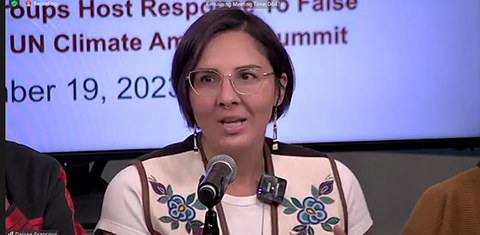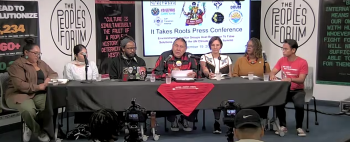Image Caption
Summary
Local Journalism Initiative Reporter
Windspeaker.com
Eriel Tchekwie Deranger, executive director for Indigenous Climate Action (ICA) joined other Indigenous and racialized activist groups in New York this morning to condemn what they consider the lack of real action being undertaken by the United Nations as government leaders and heads of state discuss how to meet climate change mitigation goals.
What the United Nations General Assembly is doing ahead of the UN Climate Change of Conference scheduled for Dubai at the end of the year, said Deranger, is “simply to find false solutions to allow them to continue business as usual.”

“There is a colonial insatiable need for the continuation of fossil fuel expansion driven by corporate greed and capitalism,” said Deranger, a member of the Athabasca Chipewyan First Nation.
ICA was the only Canadian-based organization at this morning’s news conference, which was held the day before the UN is to engage in a Climate Ambition Summit to accelerate action.
Deranger’s sentiments were echoed by the spokespeople representing Indigenous, Black, and People of Colour organizations from the United States however.
Today marked the second day of a two-day general assembly in New York leading up to the Sept. 20 summit.
Tom Goldtooth, executive director with the Indigenous Environmental Network, said governments, corporations, big non-governmental organizations, and banks were putting forward “false solutions” for climate mitigation, such as carbon capture and storage, carbon markets and offsets, nature-based solutions, nuclear power, biomass energy, biofuels, and hydrogen energy.
“We have to stand up. Every speaker here comes from community. They come from organizations and alliances. We’re standing up. We’re speaking out (for) voices that have been marginalized and left out of the UN climate negotiations” said Goldtooth.
The organizations, all part of the It Takes Roots coalition, represented Indigenous peoples, Black populations, and South Asian communities.
Colonialism and generations of extraction have caused inequities for marginalized communities, said Adrian Salazar with Grassroots Global Justice Alliance, and that inequity continues with “soft” government solutions.
Governments are also claiming to have consulted with Indigenous and racialized communities, as well as marginalized communities when they promote their policies.
Anthony Rogers Wright of The Black Hive, Movement for Black Lives, said such a claim was a “straight up fallacy and a lie.”
Deranger called the claims a “common tactic” to take away Indigenous voices.
She, like Wright, wondered who the “token people” the government uses as spokespeople represent and to which communities they are accountable.
“When you have those people that are developing the policies and finding token voices to stand behind them, that you should be wary. You should go directly to those grassroots organizations…to find out what the people actually want, what the people are actually demanding and what we need to do to address this crisis,” said Deranger.
As for engaging the private sector in solutions, as is being suggested by the UN, Julie Bernal with Pueblo Action Alliance said it is the private sector that has caused the climate crisis.
“They don’t speak for the people,” she said. “Their interest is to make profit. It’s to continue that infinite growth that is capitalism.”
In November, an agreement from COP27 saw the creation of a loss and damage fund to assist “developing countries that are particularly vulnerable to the adverse effects of climate change,” according to a UN Climate press release.
That’s not good enough, said Deranger.
“When we talk about climate reparations, we’re not talking about upholding legal frameworks and the rights of Indigenous peoples or Indigenous jurisprudence. We’re not talking about getting the money to those that are directly impacted…This (money) is going to states,” she said.
“We have to advocate for there to be true human rights mechanisms. True mechanisms for allowing us to have grievances from the people, not from the colonial states.”
Reparations need to happen now, said Bernal.
As for the 2015 Paris Accord, which pursues setting the limit of the temperature increase to 1.5 degrees C above pre-industrial levels, Goldtooth pointed out that any reference to Indigenous peoples lies in the preamble alone, which has “no meat or power to it.”
“We are still fighting to this day. People were telling us, large NGOs, ‘Back off, you all. At least we get something.’ It’s the get-something-NGOs we all have to struggle with. ‘We can strengthen it later.’ That was in 2015 and we’re still fighting to strengthen the language and the rights of Indigenous peoples in the operative text,” he said.
The UN’s Climate Ambition Summit will showcase leaders who are “first movers and doers” from government, business, finance, local authorities, and civil society who have “credible actions, policies and plans to keep the 1.5 C degree goal of the Paris Agreement alive and deliver climate justice to those on the front lines of the climate crisis,” reads a UN media advisory.
The summit is supposed to showcase the work being undertaken in response to the Secretary-General’s call for accelerated climate action by driving the transition to a low-carbon, equitable and climate-resilient global economy, the advisory further states.
Local Journalism Initiative Reporters are supported by a financial contribution made by the Government of Canada.

